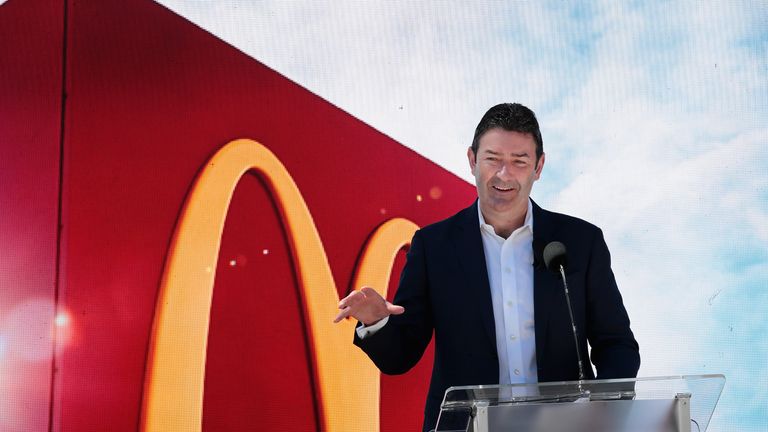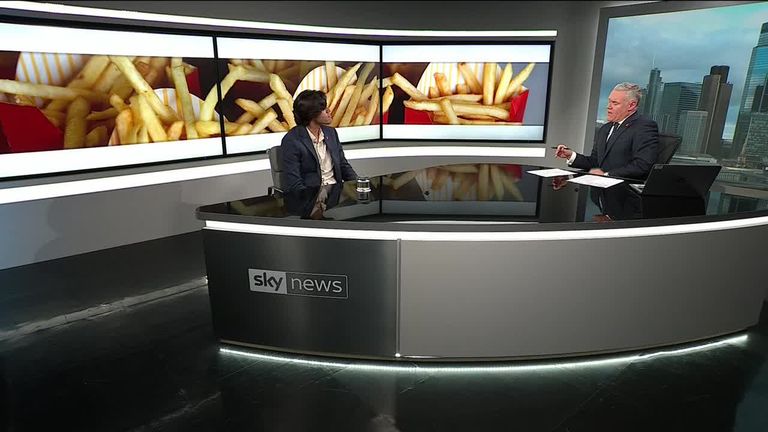McDonald's: It's not surprising that shares have fallen since its CEO was sacked
Steve Easterbrook turned the fast food giant's fortunes around particularly in the US where it was being beaten by nimbler rivals.
Monday 4 November 2019 20:09, UK
It is no surprise that shares of McDonald's Corporation have fallen on the shock departure of its chief executive Steve Easterbrook - down 3% since the news broke.
Those shares have risen by 96% since he assumed the role in March 2015 - enabling them to comfortably outstrip the S&P 500 index.
McDonald's was at a low ebb when Mr Easterbrook took the job.
The received wisdom on Wall Street was that McDonald's was losing out to competitors in the "fast casual" space - such as Chipotle Mexican Grill, Five Guys, Shake Shack and Chick-fil-A - all of which were perceived as more aspirational and offering healthier options.
These, it was thought, were luring away younger customers from the Golden Arches.
Equally damaging, there was also a perception that McDonald's had lost its edge as the best-value restaurant operator, with rivals such as Burger King offering lower-cost deals on menu items such as chicken nuggets.
These perceptions, which sent shares of McDonald's down by 3.4% during 2014 even as the S&P 500 rose by 11%, were borne out by the facts.
Under Mr Easterbrook's predecessor, Don Thompson, McDonald's was suffering its worst sales downturn in a decade and particularly in its core US market.
During 2014, Mr Thompson's last full year in charge, the number of customers visiting McDonald's restaurants globally fell by 3.6% - and by 4.1% in the US itself.
That translated to a near 15% drop in revenues during 2014 and, before Mr Thompson's departure, the company had suffered six consecutive quarters of declining sales.
Mr Easterbrook, who had been chief global brand officer, refused to accept that the business was in terminal decline.
One of the first things he did as CEO was to appoint Lucy Brady, an executive at Boston Consulting, to take over from Chris Kempczinski - who, ironically, was named overnight as Mr Easterbrook's successor as executive vice president for strategy, business development and innovation.
She immediately carried out an in-depth study of customer habits which, Mr Easterbrook later told the Financial Times, was "frustrating but actually reassuring".
Her chief finding was that McDonald's customers were not defecting to supposedly more upmarket rivals, such as Five Guys and Shake Shack, but actually to longer-standing competitors such as Wendy's and Burger King.
That was enough to convince Mr Easterbrook that McDonald's did not need to turn itself upside down in chasing the millennial dollar but simply to stick to improving its core product.
His first move as CEO was to announce that McDonald's, which he described as a "modern, progressive burger and breakfast restaurant", would, during the next two years, switch to using antibiotic-free chicken.
This was backed by a Your Questions, Our Food marketing campaign that stressed the company's credentials on the quality of its food and highlighted the freshness of its eggs and the way its beef patties were cooked.
Another early move by Mr Easterbrook was the introduction of an all-day breakfast option.
This quickly proved a huge success: by the end of 2015, McDonald's was enjoying like-for-like sales growth in its US restaurants again for the first time since 2013.
Another innovation, acknowledging that it had been a mistake for Mr Thompson to stop pushing Dollar Menu options in 2013, saw a new 'value menu' introduced with prices of $1, $2 and $3.
The overall menu, which had ballooned to more than 200 individual items, was also simplified.
Options that did not sell well or which had proved too fiddly for staff to produce as quickly as customers would have liked, such as sandwich wraps, were dropped from the menu.
The price of staple items such as coffee and soda, which had crept above those of rivals like Burger King, were cut.
Other innovations included mobile ordering and delivery.
Around a fifth of McDonald's UK sales are now delivered to customers by its partner Uber Eats.
Mr Easterbrook also blazed a trail in terms of employment.
One of his earliest initiatives as group CEO, Shine Up The Arches, was specifically aimed at improving staff morale and highlighting the company's attractiveness as a place to work.
He announced that, at the 10% of its US restaurants that McDonald's owned - the rest were operated by franchisees - workers would be paid at least $1 an hour more than the local legal minimum wage and would receive paid holidays.
All of which, to long-term followers of Mr Easterbrook's career, came as no surprise.
The playbook that brought Mr Easterbrook such success globally is very similar to the one he deployed in Britain.
A graduate of Durham University, where he played cricket alongside the future England captain Nasser Hussein, Watford-born Mr Easterbrook, an accountant, had joined McDonald's UK's finance department in 1993 and began running restaurants five years later.
After working his way up the organisation, he was appointed chief executive of McDonald's UK in April 2006.
The business was struggling at the time - Mr Easterbrook was its third CEO in four years - and had failed to shake off the stigma of the so-called "McLibel" trial in the previous decades.
Urban myths about the company's food were rife.
The term McJob, first coined by the author Douglas Coupland in his 1991 book Generation X, had also entered into common parlance.
Unlike his American predecessors, Mr Easterbrook decided to take on his critics, most memorably in debating Eric Schlosser, author of a best-selling book called Fast Food Nation, on live television.
He launched an advertising campaign around the slogan Not Bad for a McJob to highlight career opportunities at the company.
A website was launched to counteract myths about the company's food. And Mr Easterbrook even put pictures of some of the British farmers that supply McDonald's on the sheets of paper put on customers trays.
Equally as crucially, the menus were simplified, with a new choice called Little Tasters introduced at £1.59 each to sit between the cheapest menu options at 99p and the pricier options such as the Big Mac.
Coming just as consumers were tightening their purse strings, in the wake of the financial crisis, the innovation was a success.
It also attracted new customers to McDonald's, particularly young mothers taking their children, who might previously only have bought a tea or a coffee rather than a larger item of food.
Mr Easterbrook's success in turning around McDonald's UK, after years of decline, made him the natural candidate to take over as the head of McDonald's Europe in 2010.
He left the business in 2011, to become first chief executive of Pizza Express and then of the noodle chain Wagamama.
But the pull of McDonald's was always too much to resist and, two years later, Mr Thompson recruited him to become chief global brand officer - effectively number three in the organisation.
What he has achieved at McDonald's, a business few thought it would be possible to turn around, has been truly impressive.
When the dust has settled, that will make Mr Easterbrook a sought-after executive elsewhere, assuming he wants another big job.









